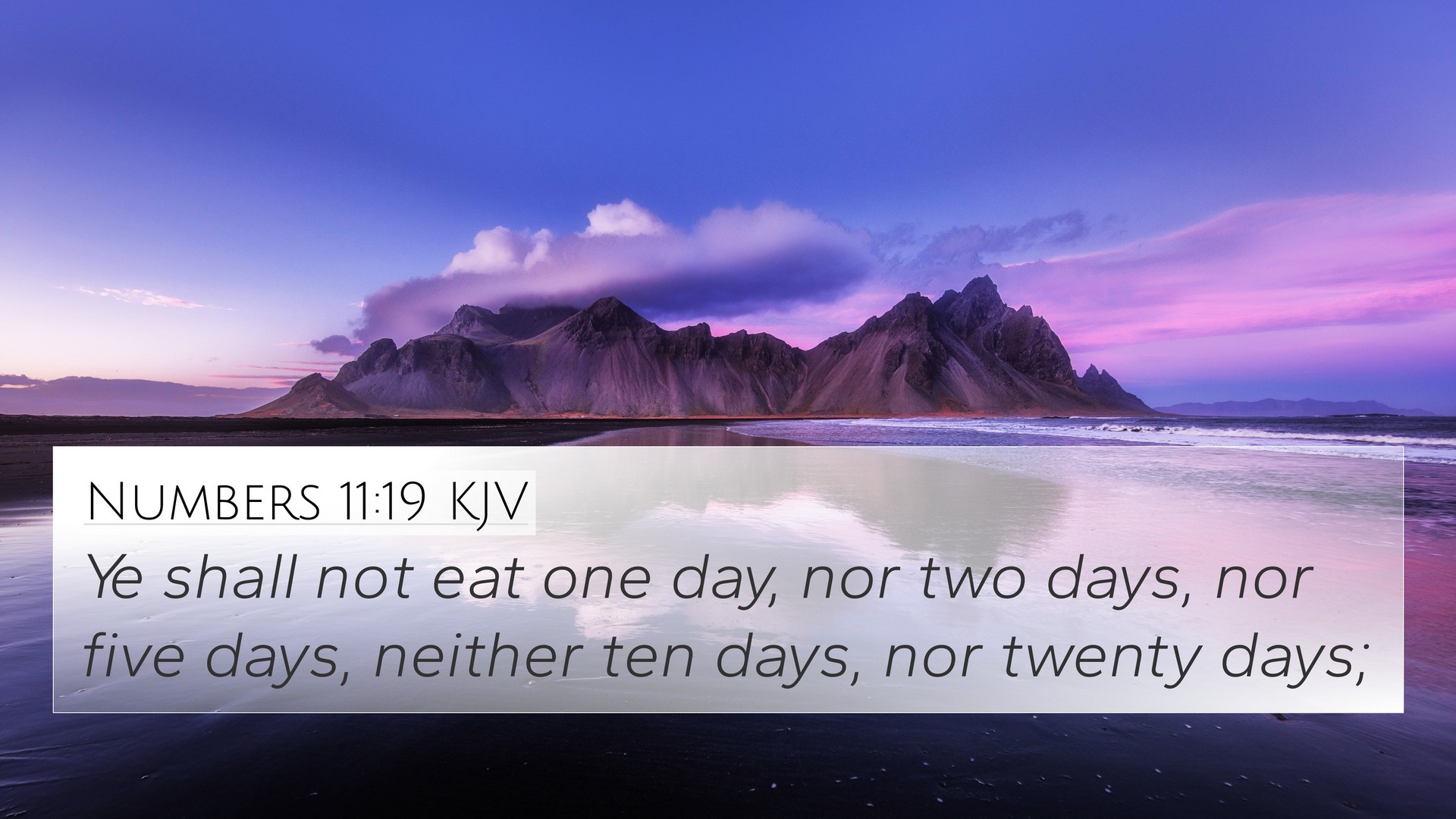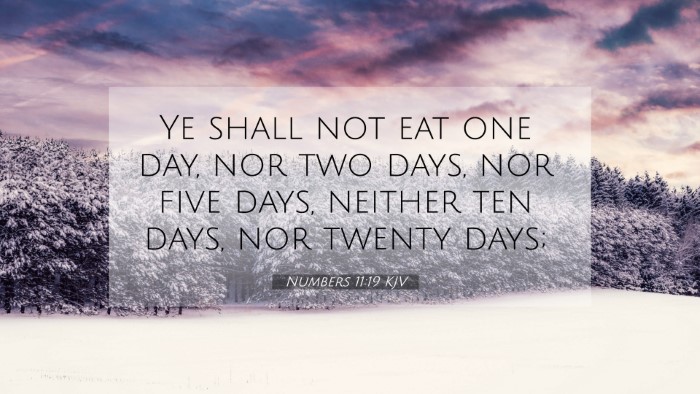Understanding Numbers 11:19
Numbers 11:19 states, "You will not eat just one day, or two days, or five, ten, or twenty days, but for a whole month until it comes out of your nostrils and you loathe it—because you have rejected the LORD who is among you and have wailed before him, saying, Why did we ever leave Egypt?"
This verse captures a moment of dissatisfaction among the Israelites after their exodus from Egypt, highlighting their longing for the comfort of their former lives even in the face of divine provision and leadership.
Exegesis and Interpretation
The commentary by Matthew Henry emphasizes the Israelites' rebellion against God's provisions. He notes that their dissatisfaction reveals a deeper heart issue of rejecting God's leadership despite His miraculous works. The mention of a month of meat serves to illustrate God's response to their grievances, emphasizing both His mercy and His judgment.
Albert Barnes elaborates on the reasons behind their complaints, stressing that their former life in Egypt is romanticized in memory, overshadowing the harshness of their enslavement. He connects this to the human tendency to overlook past sufferings when faced with current hardships.
According to Adam Clarke, this passage serves as a warning against ingratitude toward divine provision. Clarke's insights remind readers that God's gifts, while abundant, come with expectations of gratitude and obedience, and failure to appreciate these gifts leads to dire consequences.
Key Themes
- Human Discontent: The Israelites’ lamentation indicates a general human tendency to be discontent with God’s provision.
- God’s Justice and Mercy: God’s response illustrates His dual nature; He offers mercy yet insists upon consequences for rebellion.
- Rejection of Divine Leadership: The verse underscores the Israelites' rejection of God's sovereignty over their lives.
Cross-References
This verse relates to several other scriptures that encapsulate similar themes of dissatisfaction and divine provision. Some notable cross-references include:
- Exodus 16:2-3: The Israelites complain about the lack of food, echoing their yearning for Egypt.
- Psalm 78:18-19: The Israelites challenge God’s ability to provide, seeking meat as security.
- 1 Corinthians 10:10: Paul references the Israelites’ rebellion as a warning to the Corinthians, highlighting historical lessons.
- Philippians 4:11-12: Paul discusses contentment in all circumstances, contrasting the Israelites' discontent.
- Hebrews 3:16-19: The passage discusses the hardening of hearts, drawing from Israel's disobedience as a cautionary tale.
- Romans 1:21: This verse discusses mankind's failure to honor God despite His clear revelations, paralleling the rejection found in Numbers.
- Ezekiel 20:5-6: Reminds the people of Israel of God’s declaration of His covenant and their rebellious spirit.
Practical Applications
This verse compels readers to reflect on their own attitudes towards God's providence. It serves as a admonition to cultivate gratitude and awareness of the blessings one receives. Key applications include:
- Gratitude: Regularly reflect on what God has provided rather than fixating on perceived shortcomings.
- Contentment: Learn to be content in all circumstances, understanding that God knows our needs.
- Submission to Divine Will: Recognize the importance of submitting to God’s plans and timing in our lives.
Connections with Other Biblical Texts
The themes within Numbers 11:19 resonate throughout the entirety of scripture, demonstrating a rich tapestry of inter-Biblical dialogue. Reflecting on the historic context illuminates how God’s provision and human complaints consistently surface in the narrative of God's people.
For anyone interested in exploring these links more deeply, utilizing tools for Bible cross-referencing, such as a Bible concordance or a dedicated Bible cross-reference guide, is beneficial. These resources will help uncover thematic Bible verse connections and facilitate a comprehensive Bible cross-reference study.
In summary, Numbers 11:19 offers a profound insight into the human condition, echoing through history, showing the continual struggle with gratitude and submission to God’s will. Through cross-referencing biblical texts and applying these lessons, believers can forge a deeper understanding and commitment to a life reflective of God’s provisions.


